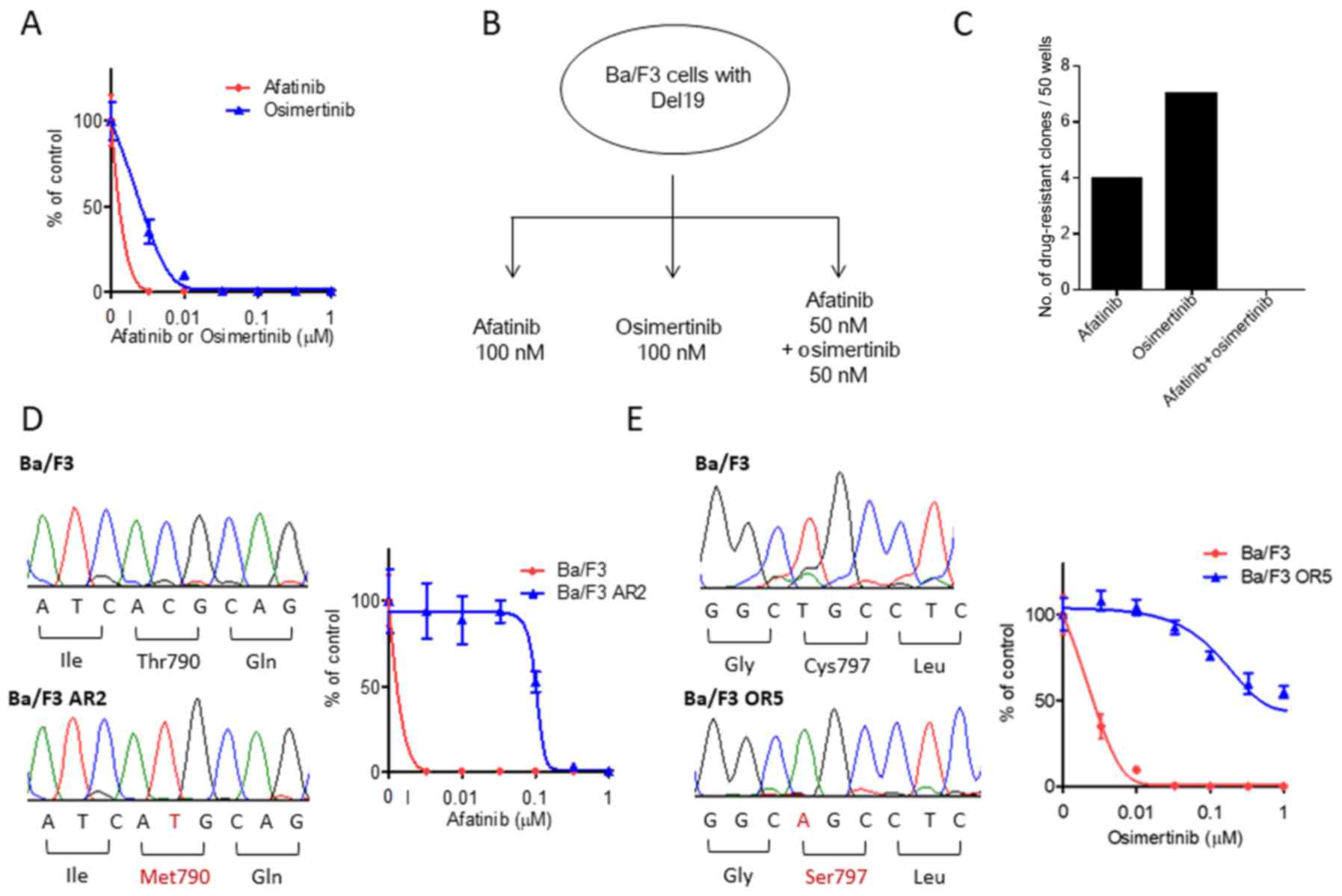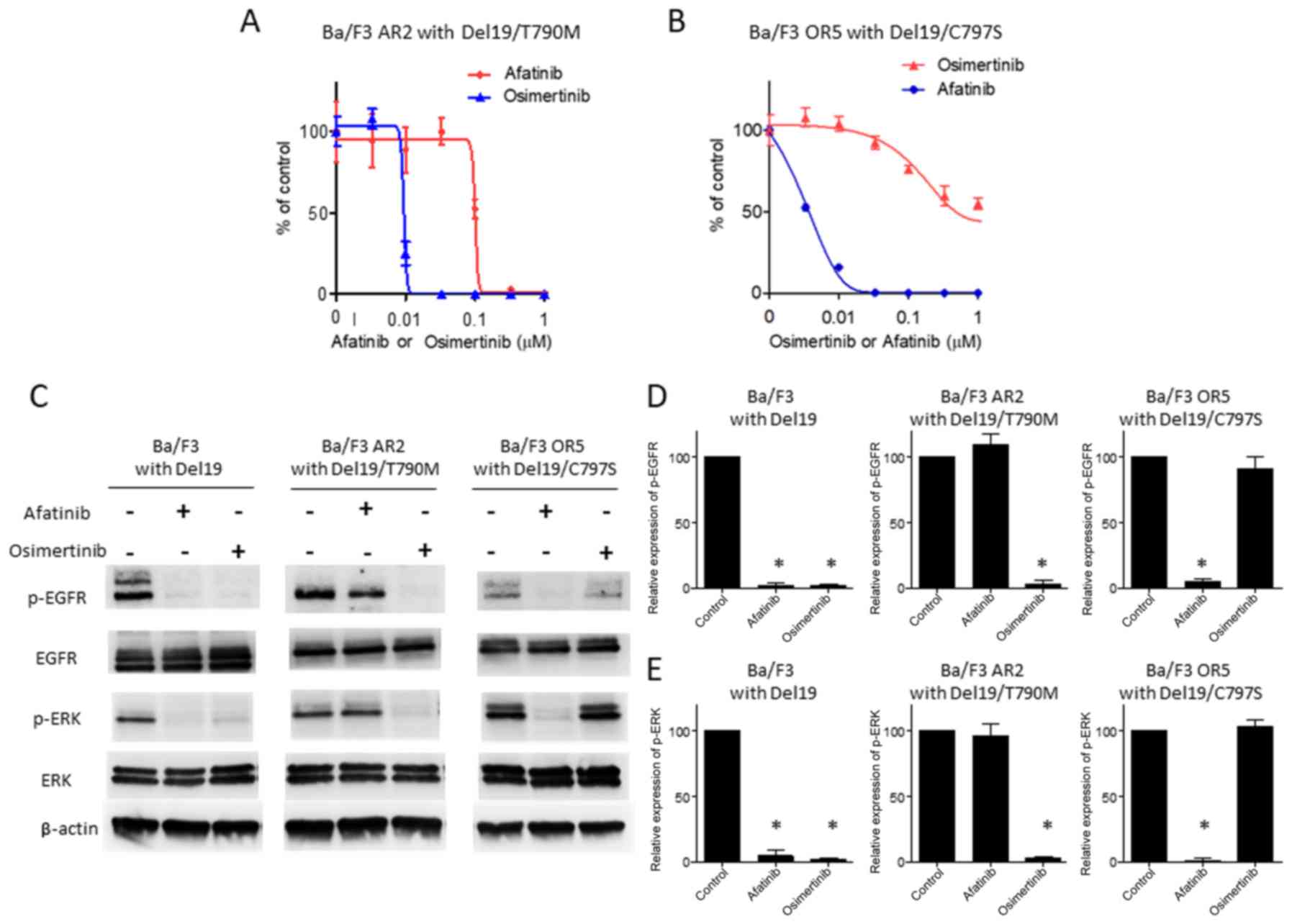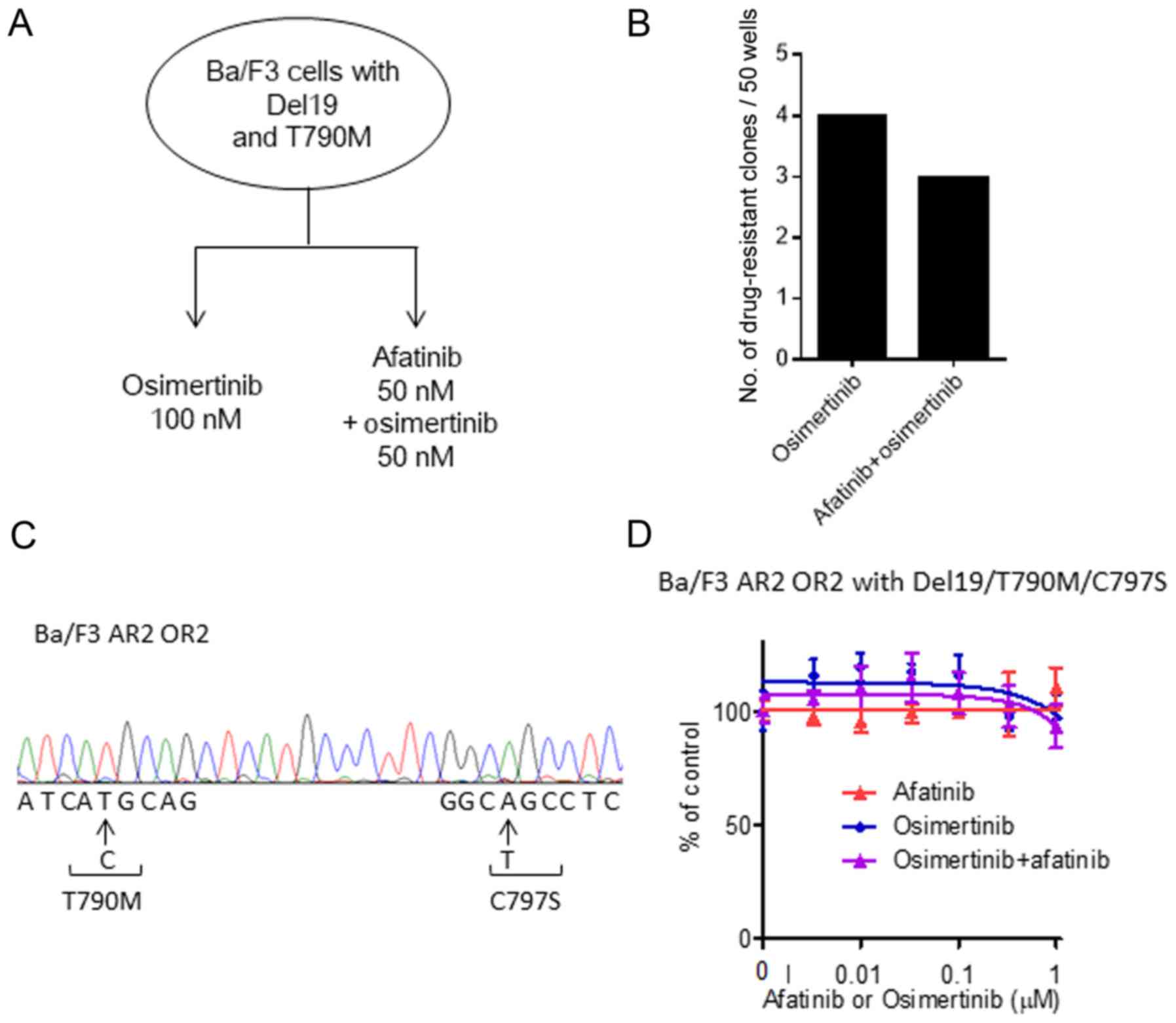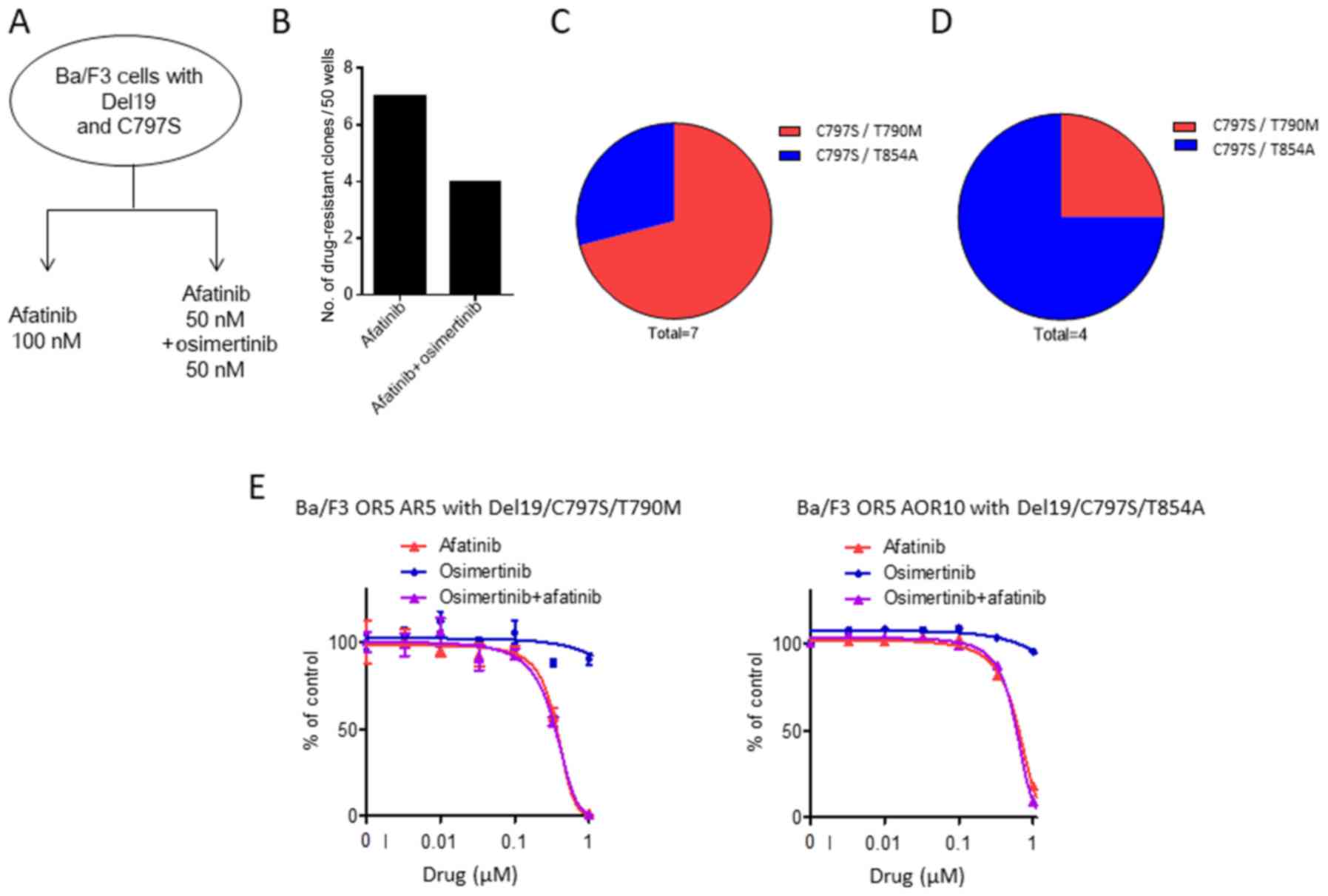|
1
|
Mitsudomi T, Kosaka T and Yatabe Y:
Biological and clinical implications of EGFR mutations in lung
cancer. Int J Clin Oncol. 11:190–198. 2006. View Article : Google Scholar : PubMed/NCBI
|
|
2
|
Maemondo M, Inoue A, Kobayashi K, Sugawara
S, Oizumi S, Isobe H, Gemma A, Harada M, Yoshizawa H, Kinoshita I,
et al: Gefitinib or chemotherapy for non-small-cell lung cancer
with mutated EGFR. N Engl J Med. 362:2380–2388. 2010. View Article : Google Scholar : PubMed/NCBI
|
|
3
|
Mitsudomi T, Morita S, Yatabe Y, Negoro S,
Okamoto I, Tsurutani J, Seto T, Satouchi M, Tada H, Hirashima T, et
al: Gefitinib versus cisplatin plus docetaxel in patients with
non-small-cell lung cancer harbouring mutations of the epidermal
growth factor receptor (WJTOG3405): An open label, randomised phase
3 trial. Lancet Oncol. 11:121–128. 2010. View Article : Google Scholar : PubMed/NCBI
|
|
4
|
Nakamura A, Inoue A, Morita S, Hosomi Y,
Kato T, Fukuhara T, Gemma A, Takahashi K, Fujita Y, Harada T, et
al: Phase III study comparing gefitinib monotherapy (G) to
combination therapy with gefitinib, carboplatin, and pemetrexed
(GCP) for untreated patients (pts) with advanced non-small cell
lung cancer (NSCLC) with EGFR mutations (NEJ009). J Clin Oncol. 36
Suppl 15:S90052018. View Article : Google Scholar
|
|
5
|
Furuya N, Fukuhara T, Saito H, Watanabe K,
Sugawara S, Iwasawa S, Tsunezuka Y, Yamaguchi O, Okada M, Yoshimori
K, et al: Phase III study comparing bevacizumab plus erlotinib to
erlotinib in patients with untreated NSCLC harboring activating
EGFR mutations: NEJ026. J Clin Oncol. 36 Suppl 15:S90062018.
View Article : Google Scholar
|
|
6
|
Sequist LV, Waltman BA, Dias-Santagata D,
Digumarthy S, Turke AB, Fidias P, Bergethon K, Shaw AT, Gettinger
S, Cosper AK, et al: Genotypic and histological evolution of lung
cancers acquiring resistance to EGFR inhibitors. Sci Transl Med.
75:75ra262011.
|
|
7
|
Li D, Ambrogio L, Shimamura T, Kubo S,
Takahashi M, Chirieac LR, Padera RF, Shapiro GI, Baum A,
Himmelsbach F, et al: BIBW2992, an irreversible EGFR/HER2 inhibitor
highly effective in preclinical lung cancer models. Oncogene.
27:4702–4711. 2008. View Article : Google Scholar : PubMed/NCBI
|
|
8
|
Park K, Tan EH, O'Byrne K, Zhang L, Boyer
M, Mok T, Hirsh V, Yang JC, Lee KH, Lu S, et al: Afatinib versus
gefitinib as first-line treatment of patients with EGFR
mutation-positive non-small-cell lung cancer (LUX-Lung 7): A phase
2B, open-label, randomised controlled trial. Lancet Oncol.
17:577–589. 2016. View Article : Google Scholar : PubMed/NCBI
|
|
9
|
Wu YL, Cheng Y, Zhou X, Lee KH, Nakagawa
K, Niho S, Tsuji F, Linke R, Rosell R, Corral J, et al: Dacomitinib
versus gefitinib as first-line treatment for patients with
EGFR-mutation-positive non-small-cell lung cancer (ARCHER 1050): A
randomised, open-label, phase 3 trial. Lancet Oncol. 18:1454–1466.
2017. View Article : Google Scholar : PubMed/NCBI
|
|
10
|
Katakami N, Atagi S, Goto K, Hida T, Horai
T, Inoue A, Ichinose Y, Koboyashi K, Takeda K, Kiura K, et al:
LUX-Lung 4: A phase II trial of afatinib in patients with advanced
non-small-cell lung cancer who progressed during prior treatment
with erlotinib, gefitinib, or both. J Clin Oncol. 31:3335–3341.
2013. View Article : Google Scholar : PubMed/NCBI
|
|
11
|
Cross DA, Ashton SE, Ghiorghiu S, Eberlein
C, Nebhan CA, Spitzler PJ, Orme JP, Finlay MR, Ward RA, Mellor MJ,
et al: AZD9291, an irreversible EGFR TKI, overcomes T790M-mediated
resistance to EGFR inhibitors in lung cancer. Cancer Discov.
4:1046–1061. 2014. View Article : Google Scholar : PubMed/NCBI
|
|
12
|
Janne PA, Yang JC, Kim DW, Planchard D,
Ohe Y, Ramalingam SS, Ahn MJ, Kim SW, Su WC, Horn L, et al: AZD9291
in EGFR inhibitor-resistant non-small-cell lung cancer. N Engl J
Med. 372:1689–1699. 2015. View Article : Google Scholar : PubMed/NCBI
|
|
13
|
Mok TS, Wu YL, Ahn MJ, Garassino MC, Kim
HR, Ramalingam SS, Shepherd FA, He Y, Akamatsu H, Theelen WS, et
al: Osimertinib or platinum-pemetrexed in EGFR T790M-positive lung
cancer. N Engl J Med. 376:629–640. 2017. View Article : Google Scholar : PubMed/NCBI
|
|
14
|
Kobayashi Y, Togashi Y, Yatabe Y, Mizuuchi
H, Jangchul P, Kondo C, Shimoji M, Sato K, Suda K, Tomizawa K, et
al: EGFR exon 18 mutations in lung cancer: Molecular predictors of
augmented sensitivity to afatinib or neratinib as compared with
first- or third-generation TKIs. Clin Cancer Res. 21:5305–5313.
2015. View Article : Google Scholar : PubMed/NCBI
|
|
15
|
Kobayashi Y, Azuma K, Nagai H, Kim YH,
Togashi Y, Sesumi Y, Chiba M, Shimoji M, Sato K, Tomizawa K, et al:
Characterization of EGFR T790M, L792F, and C797S mutations as
mechanisms of acquired resistance to afatinib in lung cancer. Mol
Cancer Ther. 16:357–364. 2017. View Article : Google Scholar : PubMed/NCBI
|
|
16
|
Bean J, Riely GJ, Balak M, Marks JL,
Ladanyi M, Miller VA and Pao W: Acquired resistance to epidermal
growth factor receptor kinase inhibitors associated with a novel
T854A mutation in a patient with EGFR-mutant lung
adenocarcinoma. Clin Cancer Res. 14:7519–7525. 2008. View Article : Google Scholar : PubMed/NCBI
|
|
17
|
Avizienyte E, Ward RA and Garner AP:
Comparison of the EGFR resistance mutation profiles generated by
EGFR-targeted tyrosine kinase inhibitors and the impact of drug
combinations. Biochem J. 415:197–206. 2008. View Article : Google Scholar : PubMed/NCBI
|
|
18
|
Tanaka K, Nosaki K, Otsubo K, Azuma K,
Sakata S, Ouchi H, Morinaga R, Wataya H, Fujii A, Nakagaki N, et
al: Acquisition of the T790M resistance mutation during afatinib
treatment in EGFR tyrosine kinase inhibitor-naïve patients with
non-small cell lung cancer harboring EGFR mutations.
Oncotarget. 8:68123–68130. 2017. View Article : Google Scholar : PubMed/NCBI
|
|
19
|
Thress KS, Paweletz CP, Felip E, Cho BC,
Stetson D, Dougherty B, Lai Z, Markovets A, Vivancos A, Kuang Y, et
al: Acquired EGFR C797S mutation mediates resistance to AZD9291 in
non-small cell lung cancer harboring EGFR T790M. Nat Med.
21:560–562. 2015. View
Article : Google Scholar : PubMed/NCBI
|
|
20
|
Regales L, Gong Y, Shen R, de Stanchina E,
Vivanco I, Goel A, Koutcher JA, Spassova M, Ouerfelli O,
Mellinghoff IK, et al: Dual targeting of EGFR can overcome a major
drug resistance mutation in mouse models of EGFR mutant lung
cancer. J Clin Invest. 119:3000–3010. 2009.PubMed/NCBI
|
|
21
|
Uchibori K, Inase N, Araki M, Kamada M,
Sato S, Okuno Y, Fujita N and Katayama R: Brigatinib combined with
anti-EGFR antibody overcomes osimertinib resistance in EGFR-mutated
non-small-cell lung cancer. Nat Commun. 8:147682017. View Article : Google Scholar : PubMed/NCBI
|
|
22
|
Jia Y, Yun CH, Park E, Ercan D, Manuia M,
Juarez J, Xu C, Rhee K, Chen T, Zhang H, et al: Overcoming
EGFR(T790M) and EGFR(C797S) resistance with mutant-selective
allosteric inhibitors. Nature. 534:129–132. 2016. View Article : Google Scholar : PubMed/NCBI
|
|
23
|
Ercan D, Choi HG, Yun CH, Capelletti M,
Xie T, Eck MJ, Gray NS and Jänne PA: EGFR mutations and resistance
to irreversible pyrimidine-based EGFR inhibitors. Clin Cancer Res.
21:3913–3923. 2015. View Article : Google Scholar : PubMed/NCBI
|
|
24
|
Niederst MJ, Hu H, Mulvey HE, Lockerman
EL, Garcia AR, Piotrowska Z, Sequist LV and Engelman JA: The
allelic context of the C797S mutation acquired upon treatment with
third-generation EGFR inhibitors impacts sensitivity to subsequent
treatment strategies. Clin Cancer Res. 21:3924–3933. 2015.
View Article : Google Scholar : PubMed/NCBI
|
|
25
|
Uchibori K, Inase N, Nishio M, Fujita N
and Katayama R: Identification of mutation accumulation as
resistance mechanism emerging in first-line osimertinib treatment.
J Thorac Oncol. 13:915–925. 2018. View Article : Google Scholar : PubMed/NCBI
|
|
26
|
Della Corte CM, Malapelle U, Vigliar E,
Pepe F, Troncone G, Ciaramella V, Troiani T, Martinelli E, Belli V,
Ciardiello F, et al: Efficacy of continuous EGFR-inhibition and
role of Hedgehog in EGFR acquired resistance in human lung cancer
cells with activating mutation of EGFR. Oncotarget. 8:23020–23032.
2017. View Article : Google Scholar : PubMed/NCBI
|
|
27
|
Engelman JA, Zejnullahu K, Mitsudomi T,
Song Y, Hyland C, Park JO, Lindeman N, Gale CM, Zhao X, Christensen
J, et al: MET amplification leads to gefitinib resistance in
lung cancer by activating ERBB3 signaling. Science. 316:1039–1043.
2007. View Article : Google Scholar : PubMed/NCBI
|
|
28
|
Tricker EM, Xu C, Uddin S, Capelletti M,
Ercan D, Ogino A, Pratilas CA, Rosen N, Gray NS, Wong KK, et al:
Combined EGFR/MEK inhibition prevents the emergence of resistance
in EGFR mutant lung cancer. Cancer Discov. 5:960–971. 2015.
View Article : Google Scholar : PubMed/NCBI
|
|
29
|
Paz-Ares L, Tan EH, O'Byrne K, Zhang L,
Hirsh V, Boyer M, Yang JC, Mok T, Lee KH, Lu S, et al: Afatinib
versus gefitinib in patients with EGFR mutation-positive
advanced non-small-cell lung cancer: Overall survival data from the
phase IIb LUX-Lung 7 trial. Ann Oncol. 28:270–277. 2017. View Article : Google Scholar : PubMed/NCBI
|
|
30
|
Park K, Tan E, O'Byrne K, Zhang L, Boyer
M, Mok T, Hirsh V, Yang JC, Schuler M, Yamamoto N, et al: P3.01–039
Sequential afatinib-osimertinib therapy in EGFR mutation-positive
(EGFRm+) NSCLC: Analysis of time on treatment and OS. J Thorac
Oncol. 12 Suppl 2:S2215–S2216. 2017. View Article : Google Scholar
|
|
31
|
Piotrowska Z, Nagy RJ, Fairclough S,
Lanman R, Marcoux N, Gettinger S, Owonikoko T, Ramalingam S and
Sequist L: OA 09.01 Characterizing the genomic landscape of EGFR
C797S in lung cancer using ctDNA next-generation sequencing. J
Thorac Oncol. 12 Suppl 2:S17672017. View Article : Google Scholar
|


















